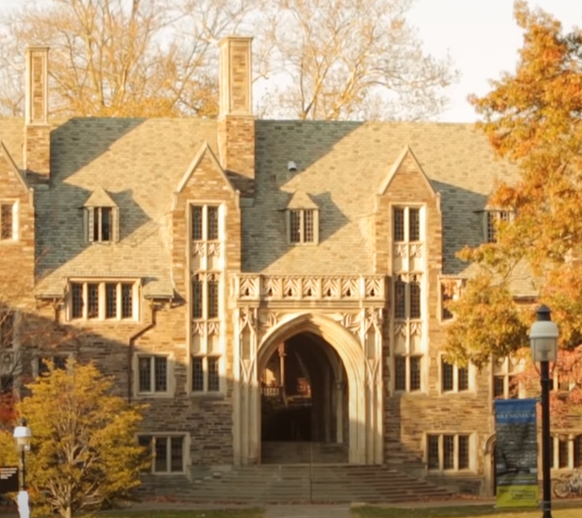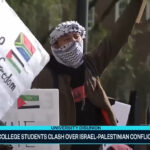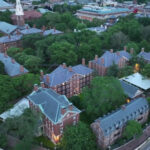Suppressing Free Speech in the Name of Inclusion and Racial Equity at Princeton

Richard L. Cravatts, Ph.D., a Freedom Center Journalism Fellow in Academic Free Speech and President Emeritus of Scholars for Peace in the Middle East, is the author of Dispatches From the Campus War Against Israel and Jews.
The ubiquity of race obsession on campuses in the age of Black Lives Matter and George Floyd showed itself at Princeton University, too, so much so that in September its President, Christopher L. Eisgruber, published a self-flagellating open letter in which he bemoaned the fact that “[r]acism and the damage it does to people of color persist at Princeton” and that “racist assumptions” are “embedded in structures of the University itself.” At least one federal agency took Eisgruber at his word and Princeton subsequently received a letter from the Department of Education (DOE) questioning if the university was, in light of this self-professed racism, in violation of Title VI of the Civil Rights Act of 1964.
“Based on its admitted racism,” the letter read, the DOE “is concerned Princeton’s nondiscrimination and equal opportunity assurances . . . may have been false,” that “Princeton perhaps knew, or should have known, these assurances were false at the time they were made,” and “Princeton’s many nondiscrimination and equal opportunity claims to students, parents, and consumers in the market for education certificates may have been false, misleading, and actionable substantial misrepresentations . . . .”
That investigation by the DOE may be of concern for Princeton officials, but the frenzy over racism from inside the campus community is proving to be a thornier problem as the campus has reacted vocally to some recent instances of alleged racism by faculty and students—even questioning whether academic freedom should be restricted to make sure no one’s feelings are hurt by racist expression.
After the Princeton administration was insufficiently contrite in the wake of several racist incidents, claiming that the school’s free speech policies permitted such expression regardless of the ill-effects, the race monitors on campus complained that honoring free speech compromised Princeton’s own very public commitment to inclusion and racial equity. A November 8th editorial in the Daily Princetonian by the paper’s editorial board entitled “To create a more inclusive campus, Princeton must act against racist speech,” for example, criticized the administration’s failure to suppress what they perceived as racist expression, instead upholding the principle of academic free speech.
Decrying what they characterized as “the University’s hardline free-speech policy” which did not punish racist speech, the editorialists claimed that permitting hateful expression in the name of free speech is contradictory to inclusion, and that “This obfuscation allows our community to push instances of racism out of sight, as the University ignores the harassment that Black students face.” Referring to “incidents over the summer — most notably, [Princeton] Professor Joshua Katz’s op-ed, in which he referred to Black student activists [Princeton’s Black Justice League] as ‘terrorists,’ and a student’s use of the n-word in a Facebook post . . ,” the editorial suggested that since the perpetrators of these transgressions were not punished, “this obfuscation allows our community to push instances of racism out of sight, as the University ignores the harassment that Black students face.”
The corollary problem with academic free speech, they mistakenly contended, is that it is a tool of white supremacy, a way that the majority insulates its racism from exposure and, with impunity, exposes minorities to racist expression. “For too long, white people, and particularly white men, in this country and on this campus,” the editorial asserted, “have held the power to decide what constitutes acceptable speech and action. They have consistently deemed racist, and particularly anti-Black, fictions acceptable.”
The editorial further suggested that Princeton disingenuously “trots out its free speech policy to brush aside cases of racism while failing to protect the speech of those protesting racism,” ignoring the fact that they were in that very instant protesting the racism they perceive and using their own freedom of speech to do so very publicly in the pages of the university’s newspaper.
But the core of the editorial’s argument is found in the notion that what is referred to as “anti-Black fictions” in the alleged racist speech of some Princeton individuals are “ideas [that] cause demonstrable harm to students of color who make up the University community.” It is the prospect that some victims may be made uncomfortable, uneasy, triggered, embarrassed, angered, or otherwise negatively affected that must be paramount, not individuals’ right to articulate their viewpoints and opinions—about race or anything else, for that matter.
How do alleged racist ideas “cause harm to students of color”? Making a specious intellectual leap, the editorial claimed that ideas minority students have labeled as racist “. . . force students to question their place on our campus, because they suggest Black people’s intellectual or behavioral inferiority make them incapable of succeeding in higher education.”
One would assume that young journalists on the editorial board of a newspaper that exists under the protective umbrella of the First Amendment and the core right of freedom of speech would be conscious of the vital importance of free speech and expression, both at Princeton and in the larger democracy in which they live and work. But, no, for them the “abstract principle” of free speech should be subordinated to another concern, namely, making sure that no one is emotionally injured or challenged by the expression of ideas of which they do not approve. “Those who use free speech to defend racist ideas are essentially saying that it is acceptable for Black students to exist in a perpetual state of discomfort,” the editorial read, “leaving them vulnerable to numerous traumatic experiences, in the name of an abstract principle that is prioritized over the well-being of our community members.”
Other members of the Princeton community chimed in with similar ill-conceived views, indicating that they, too, do not respect the primacy of academic free speech and believe that hurting someone’s feelings is a graver concern than the potential loss of the right to express opinions—even controversial and hateful ones. In a July Princetonian op-ed in which he complained about respecting free speech as opposed to protecting the feelings of minorities, for instance, Professor Andrew Cole of Princeton’s English Department wrote that “This is why white supremacy is the opposite of ‘academic’ and contrary to ‘freedom.’ Yet time and again whenever white supremacy is challenged, or whenever white privilege (which is a subtler form of white supremacy) is questioned, people suddenly start talking about academic freedom.”
In Cole’s view, then, academic freedom is no more than a tool of white supremacy, and that when Princeton officials refused to punish those accused of racist expression, they employed that white privilege inherent in academic free speech to sidestep being called actual racists. “In a country so embarrassingly incapable of acknowledging its history of racism and anti-Black terrorism,” Cole wrote, “it strikes many of us as a curious indirection to talk about academic freedom when we speak of anti-racism.” In other words, academic freedom does not, and should not, provide a shield for racist expression.
The eight students who wrote an August op-ed in the Princetonian, entitled “Princeton, it’s 2020: stop protecting racial slurs,” reiterated this same intellectually defective theme, suggesting that the university’s inadequate “response falsely asserts the compatibility of unfettered free speech and anti-racism,” and that “derogatory, offensive, racist speech must be subject to reprimand and punishment.” While the students generously conceded that not all “controversial speech needs to be banned,” they suggested that, nevertheless, racist expression constitutes hate speech and “hate speech in the form of racial epithets and attacks does not contribute to meaningful discussion.”
Not only does racist expression cause “harm” to students of color, according to these students, it actually serves to suppress the expression of opposing viewpoints by minority students. “By targeting race, said remarks automatically undermine the position of students of color and discourage them from responding at all. And according to the op-ed, the opposing viewpoints of others have no actual value in the marketplace of ideas and are merely “attacks [that] are designed to harm, to belittle, and to silence” black students.
What these writers are actually saying is not that their speech is chronically silenced and that they have been unable to make their views and ideas be heard; what they are saying is that when they tried to suppress the expression of those with opposing views, they were unsuccessful, and they incorrectly interpreted this failure to silence the racist notions of others as being a “silencing” of their own views. Because Princeton did not punish those offending racists these students want to censure, they made the false assumption that so-called hate speech is being tolerated at their expense, using the cover of academic free speech to protect racists from punishment for their alleged bigotry.
Those at Princeton who feel that inclusion is a superior goal than protecting academic free speech have misunderstood that they themselves benefit from and enjoy free speech protections, and that the university’s enshrining this right is both inevitable and appropriate. In 2015, in fact, Princeton adopted what are known as the Chicago Principles, setting forth a very clear dedication to academic free speech, even when it seems to conflict with the other positive ambitions of inclusion and racial equity. “Of course, the ideas of different members of the University community will often and quite naturally conflict,” reads Princeton’s “Statement on Freedom of Expression.” “But it is not the proper role of the University to attempt to shield individuals from ideas and opinions they find unwelcome, disagreeable, or even deeply offensive. Although the University greatly values civility, and although all members of the University community share in the responsibility for maintaining a climate of mutual respect, concerns about civility and mutual respect can never be used as a justification for closing off discussion of ideas, however offensive or disagreeable those ideas may be to some members of our community [emphasis added].”
The problem with naming certain expression as hate speech and expecting that it should be subject to more severe punishment when expressed is that, legally speaking, no such thing exists. Except for very specific and rare exceptions, all speech—including racist, crude, even obnoxious speech—enjoys constitutional protection. While free speech advocates know this law, many students apparently do not, or do not wish to acknowledge First Amendment rights when race, ethnicity, and gender are involved. A 2019 Knight Foundation report entitled “Free Expression on College Campuses,” for example, found that 41% of college students surveyed believed that what was defined as hate speech should not be protected speech. While 74% of college males believed hate speech deserved protection, 53% of college women believed it deserved no such protection. There was a disparity in opinions depending on the students’ race, also: 62% of white students believed that hate speech should enjoy protection, while, unsurprisingly, only 48% of black students shared this view.
The reality is that most college campuses, including certainly Princeton, are the safest places, emotionally and intellectually, on earth for students who are among the most pampered and privileged young adults in history. Actual racism—from faculty, students, and administrators—is so rare and benign that in order to identify cases where racism reveals itself, university diversocrats and the student victims they serve must assiduously ferret out examples of racist thought and behavior—including accusations of systemic racism, implied racism, triggers, microaggressions, white privilege, and, recently, instances when faculty or students have defended law enforcement, criticized the motives and tactics of Black Lives Matter, or characterized, as Professor Katz made the mistake of doing, Princeton’s activist Black Justice League as being “terrorists” due to their aggressive and radical activism in 2015 when they presented a list demands and grievances, berated fellow students, and occupied university property.
For that offense, Katz has been maligned and made a pariah on the Princeton campus, and tendentious students have been angered because the university has failed to punish him for what they perceive to be his errant behavior and racist ways. But these students have intentionally failed to see any value in Katz’s reasoned and insightful views on how Princeton’s current self-flagellation over race is both overblown and itself inequitable. More importantly, they have shown themselves willing to abandon one of academia’s core principles—academic free speech—in the name of inclusion, racial justice, and supposed civility.
The right to free speech, of course, also protects these very students who are so willing to discard its protection to achieve other social objectives. In the 2017 case Matal v.Tam in language echoing the Chicago Principles, the Supreme Court reaffirmed the notion that even offensive speech, even what some define as hate speech, enjoys constitutional protection. “A law that can be directed against speech found offensive to some portion of the public,” the court found, “can be turned against minority and dissenting views to the detriment of all.”
“Speech that demeans on the basis of race, ethnicity, gender, religion, age, disability, or any other similar ground is hateful,” the court concluded, “but the proudest boast of our free speech jurisprudence is that we protect the freedom to express ‘the thought that we hate.’”




